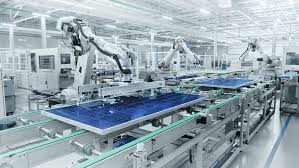
Revitalising the Manufacturing Sector: A Path to Economic Prosperity
The Importance of Manufacturing in Today’s Economy
Manufacturing plays a crucial role in driving economic growth and development in countries around the world. From producing consumer goods to industrial equipment, manufacturing is the backbone of many industries and contributes significantly to GDP.
One of the key benefits of manufacturing is its ability to create jobs and support local communities. Factories and production facilities provide employment opportunities for a wide range of skilled workers, from engineers and technicians to assembly line workers.
In addition to job creation, manufacturing also fosters innovation and technological advancement. Companies invest in research and development to improve processes, create new products, and stay competitive in the global market.
Furthermore, manufacturing contributes to trade balance by exporting goods produced domestically. Countries with strong manufacturing sectors often have a trade surplus, boosting their overall economic performance.
Despite the rise of service-based industries, manufacturing remains essential for a thriving economy. It provides stability, diversity, and resilience against economic downturns by offering a tangible product that drives demand and growth.
In conclusion, manufacturing is a vital component of today’s economy, driving innovation, creating jobs, supporting local communities, and contributing to overall economic prosperity. Its importance cannot be overlooked as countries strive for sustainable growth and development.
Key Insights into the Role, Challenges, and Innovations in Modern Manufacturing
- What is the role of manufacturing in the economy?
- How does manufacturing contribute to job creation?
- What are the key challenges faced by the manufacturing industry?
- How does technology impact modern manufacturing processes?
- What are some examples of successful manufacturing companies?
- What measures can be taken to improve efficiency and sustainability in manufacturing?
What is the role of manufacturing in the economy?
Manufacturing plays a pivotal role in the economy by serving as a catalyst for growth, job creation, and innovation. As a key driver of economic development, manufacturing contributes significantly to GDP and exports, enhancing a country’s competitiveness on the global stage. By producing goods ranging from consumer products to industrial machinery, manufacturing not only meets domestic demand but also fuels international trade. Moreover, manufacturing industries often lead to the establishment of supply chains, supporting various sectors and creating a ripple effect of economic activity. Overall, the role of manufacturing in the economy is essential in fostering prosperity, technological advancement, and sustainable development.
How does manufacturing contribute to job creation?
Manufacturing significantly contributes to job creation by providing employment opportunities across various skill levels and sectors. Factories and production facilities require a diverse workforce, including engineers, technicians, machine operators, assemblers, quality control specialists, and logistics personnel. The demand for skilled workers in manufacturing drives recruitment efforts and training programs to ensure a capable workforce. Additionally, the ripple effect of manufacturing extends to supporting jobs in related industries such as transportation, supply chain management, and retail. As manufacturing activities increase, so do job opportunities, making it a key driver of employment growth in economies worldwide.
What are the key challenges faced by the manufacturing industry?
The manufacturing industry faces a myriad of challenges in today’s fast-paced and competitive landscape. Some key issues include supply chain disruptions, rising raw material costs, labour shortages, and the need to adopt advanced technologies such as automation and digitalization to stay relevant and efficient. Additionally, global economic uncertainties, trade tensions, and regulatory compliance requirements pose significant hurdles for manufacturers striving to maintain profitability and sustainability in an ever-evolving market environment. Overcoming these challenges requires strategic planning, innovation, adaptability, and a commitment to continuous improvement to ensure long-term success in the manufacturing sector.
How does technology impact modern manufacturing processes?
Technology has revolutionised modern manufacturing processes, significantly enhancing efficiency, precision, and productivity. Automation, robotics, artificial intelligence, and data analytics have streamlined production lines, reducing errors and waste while increasing output. Advanced technologies enable real-time monitoring and predictive maintenance, ensuring optimal equipment performance and minimising downtime. Additionally, digital tools facilitate seamless communication and collaboration among teams, leading to faster decision-making and improved overall operational effectiveness. Overall, technology has transformed the landscape of manufacturing by driving innovation and enabling manufacturers to meet the demands of a rapidly evolving market with agility and competitiveness.
What are some examples of successful manufacturing companies?
There are several examples of successful manufacturing companies that have made a significant impact on the global market. Companies like Toyota, known for their innovative production methods and quality control standards, have become leaders in the automotive industry. Apple, with its cutting-edge technology and design prowess, has revolutionized the consumer electronics sector. Another notable example is Boeing, a key player in the aerospace industry renowned for its aircraft manufacturing capabilities. These companies exemplify excellence in manufacturing through their commitment to innovation, quality, and customer satisfaction.
What measures can be taken to improve efficiency and sustainability in manufacturing?
To enhance efficiency and sustainability in manufacturing, several measures can be implemented. Adopting lean manufacturing principles to streamline processes, reduce waste, and improve productivity is key. Investing in advanced technologies such as automation, robotics, and data analytics can also boost efficiency and accuracy in production. Implementing sustainable practices like energy-efficient operations, waste reduction strategies, and recycling initiatives can help minimise environmental impact. Collaboration with suppliers to ensure responsible sourcing of materials and implementing green supply chain practices further contributes to sustainability efforts in manufacturing. By integrating these measures into operations, manufacturers can achieve higher efficiency levels while reducing their ecological footprint for a more sustainable future.
